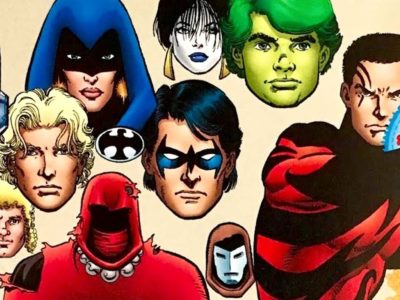
[ad_1]
Acclaimed television writer LaToya Morgan makes her comic debut with Dark Blood #1, an ambitious journey through the life and times of Avery Aldridge.
On the first page of Dark Blood #1, a disembodied narrator asserts, “Most things are never what they seem.” Ironically enough, the issue’s cover promises a mysterious, brooding story set around a black protagonist in WWII, with hints of a supernatural element – and Dark Blood‘s debut issue delivers it all with flair. From the mind of acclaimed TV writer LaToya Morgan, with art by Walt Barna and colors by A.H.G, Dark Blood offers an intriguing jumping-off point for a miniseries full of potential.
Dark Blood immediately and deliberately situates itself in time and space: Alabama, 1955, the night of the variance. In this way, it invites the reader to color the comic with their own historical knowledge, particularly in reference to the beginning of the story where a white man stalks our Black protagonist, Avery. Without warning, the narrative jumps backward ten years before the variance, depicting Avery Aldridge as a pilot in WWII. When it returns to the present, a confrontation ends in disaster, with a racist man very dead, a car totaled, and Avery fleeing the scene after displaying some beyond human capabilities. The narration continues to play with time-jumps as it educates the reader on sections of Avery’s past life and experiences.
RELATED: BOOM! Studios Announces Best of 2020 Humble Comics Bundle
Even with so much action and space-time leapfrogging, this debut issue feels deceptively short. The story orientates its main mystery around “the variance,” but that’s really only one of the enigmas that Dark Blood sets into motion. Morgan clearly has an exceptional grasp of setting up and juggling different plot threads, although she may still be attuning herself to the relative brevity of the comic medium. The issue’s only outright weakness is that very little is done to flesh out the character of Avery himself. Although we see a lot of things happen to him, and from them we can extrapolate qualities of his personality, Morgan spends this first issue building the world around Avery rather than giving us much sense of his internal life. As a result, the reader is left without much to grasp onto in terms of who Avery is, beyond being the vessel for a greater narrative.
Walt Barna’s lines are consistently impressive, playing with light and shadows to create a world that feels deeply realistic. Barna’s art captures mood and movement in a cinematic way. The duality of light, both obscuring and over-exposing to great effect, is mirrored in the use of colors. There is a bewitching sense of contrast in A.H.G.’s colors, juxtaposing warmth and cold, muted and saturated, all in close succession. Although this could, uncharitably, be seen as a discordant mistake on the part of the artists, these color choices have massive utility, both in distinguishing the distinct times and places we jump between in Dark Blood and the mindset that colors Avery’s experience of them. The disparity of these visual cues is what makes them so effective, particularly the leaps to monochrome and sepia tones, and allows creative and unique insight into Avery’s perspective.
RELATED: 9 BOOM! Studios Comics That Should Be Adapted for Netflix
Striking illustrations aside, the panel arrangement itself is a masterclass in depicting space and timing. Its panels range from narrow and tightly packed during tense sequences, to wide, equally sized panels that give an impression of freedom and scope. The lettering of AndWorld Design is just as expressive, in particular driving home the chaos of the WWII scenes with dynamic choices.
The first issue of Dark Blood delivers dramatic set-pieces with electrifying intensity, as well as birthing its own mythos and setting itself up with a whole host of questions to answer. The mystery alone is tantalizing enough to qualify Dark Blood #1 as a must-read — however, there are several dimensions it has yet to develop before it feels like a fully-fledged story. Hopefully, by addressing not only the obvious questions but also the more subtle humanistic ones further down the road, Dark Blood will be a miniseries to remember.
About The Author
[ad_2]






